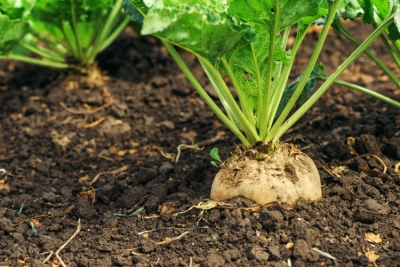Tackling Virus Yellows Disease in Sugar Beet

In the UK, sugar beet is a break crop grown and processed into sugar. One of the biggest challenges faced by sugar beet growers is Virus Yellows disease.
Virus Yellows disease, a complex of three viruses transmitted by aphids, reduces the photosynthetic capacity of sugar beet leaves, which in turn reduces the sugar content and yield of this crop.
Historically, Virus Yellows has been controlled by neonicotinoid seed treatments. Withdrawal of the majority of these pesticides in 2013 has resulted in significant reductions in sugar beet yield. In 2020, overall yield was reduced by 25% compared with the five-year average, costing the industry over £65 million.
There is now an urgent need to find new solutions to the challenge of Virus Yellows disease in sugar beet.
RNA Structure Guided therapeutics
Research at the John Innes Centre has led to the development of a non-chemical approach to control the Virus Yellows disease in sugar beet. RNA is a fundamentally important molecule within all living organisms and this technology uses the unique shape of the viral RNA structure to design anti-viral products which target and degrade the virus when inside the plant. This could provide sugar beet growers with an environmentally friendly, safe, reliable, sustainable and long-lasting protection against this virus.
This research has received considerable interest from funders including the Royal Society, European Research Council and BBSRC iCURE.
In 2024, Dr Yiliang Ding, became the first UK plant scientist to receive a Blavatnik Award, which recognises research that is transforming medicine, technology and our understanding of the world.
Developing Precision Breeding for sugar beet
We are working with two UK companies, British Sugar and the biotechnology company Tropic, to develop an innovative transformation platform to protect the British sugar beet crop against potentially catastrophic losses to virus yellows disease.
Improving resistance to Virus Yellows is one of a number of crop traits that could be improved with precision breeding, also know as gene or genome editing.
This builds on our experience in other plant and crop species, and aims transfer our genomic capabilities into sugar beet. This could enable improvements, not only to disease resistance but also other beneficial traits such as the control of bolting.
